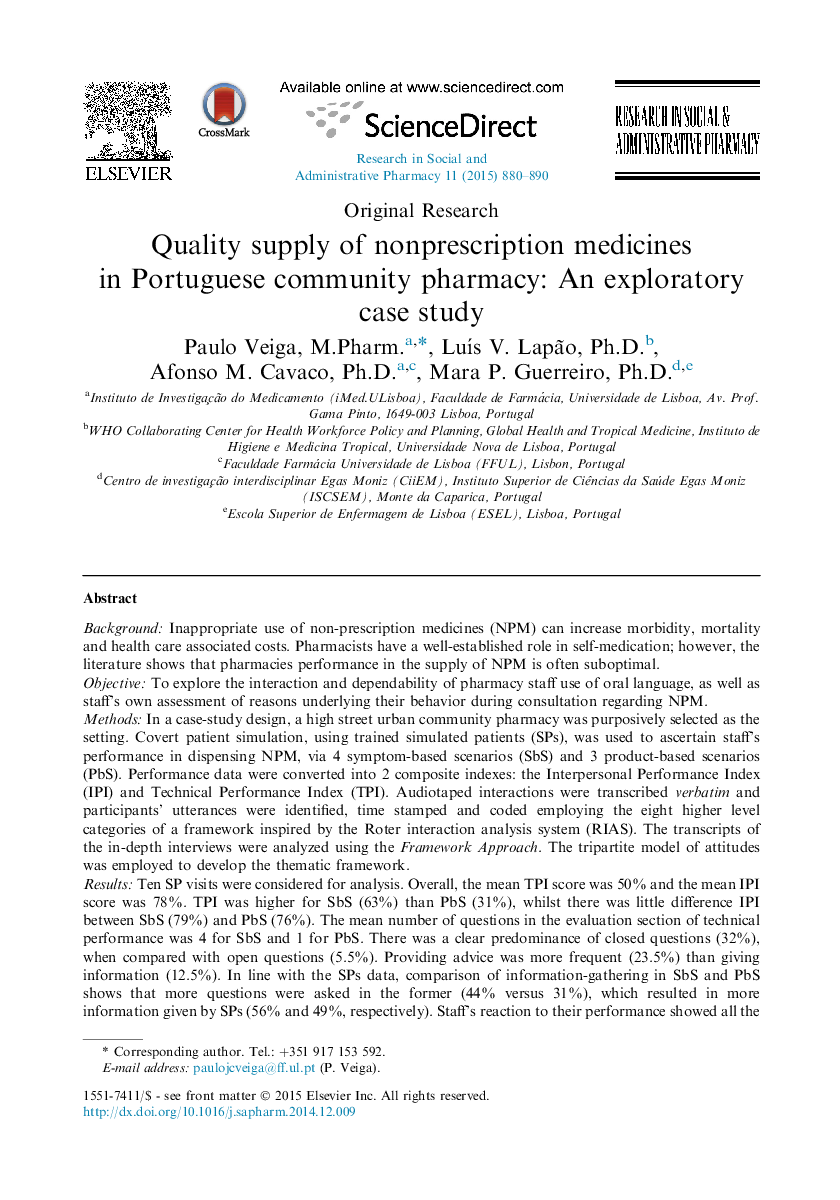| کد مقاله | کد نشریه | سال انتشار | مقاله انگلیسی | نسخه تمام متن |
|---|---|---|---|---|
| 2508306 | 1117602 | 2015 | 11 صفحه PDF | دانلود رایگان |
BackgroundInappropriate use of non-prescription medicines (NPM) can increase morbidity, mortality and health care associated costs. Pharmacists have a well-established role in self-medication; however, the literature shows that pharmacies performance in the supply of NPM is often suboptimal.ObjectiveTo explore the interaction and dependability of pharmacy staff use of oral language, as well as staff's own assessment of reasons underlying their behavior during consultation regarding NPM.MethodsIn a case-study design, a high street urban community pharmacy was purposively selected as the setting. Covert patient simulation, using trained simulated patients (SPs), was used to ascertain staff's performance in dispensing NPM, via 4 symptom-based scenarios (SbS) and 3 product-based scenarios (PbS). Performance data were converted into 2 composite indexes: the Interpersonal Performance Index (IPI) and Technical Performance Index (TPI). Audiotaped interactions were transcribed verbatim and participants' utterances were identified, time stamped and coded employing the eight higher level categories of a framework inspired by the Roter interaction analysis system (RIAS). The transcripts of the in-depth interviews were analyzed using the Framework Approach. The tripartite model of attitudes was employed to develop the thematic framework.ResultsTen SP visits were considered for analysis. Overall, the mean TPI score was 50% and the mean IPI score was 78%. TPI was higher for SbS (63%) than PbS (31%), whilst there was little difference IPI between SbS (79%) and PbS (76%). The mean number of questions in the evaluation section of technical performance was 4 for SbS and 1 for PbS. There was a clear predominance of closed questions (32%), when compared with open questions (5.5%). Providing advice was more frequent (23.5%) than giving information (12.5%). In line with the SPs data, comparison of information-gathering in SbS and PbS shows that more questions were asked in the former (44% versus 31%), which resulted in more information given by SPs (56% and 49%, respectively). Staff's reaction to their performance showed all the 3 dimensions of attitude: affective, cognitive and behavioral. Divergence between staff's views on what should be done in NPM consultations and performance data surfaced in the interviewees' accounts on direct product requests. While performance data shows that information gathering was scarce, its importance was overtly acknowledged.ConclusionsThe supply of NPM appears to be influenced by both cognitive and emotional issues. This suggests that multimodal improvement interventions are needed, targeting not only technical and interpersonal communication skills but also the organizational context. Managerial tools such as the balanced scorecard, may prove valuable in addressing improvement in the quality supply of NPM.
Journal: Research in Social and Administrative Pharmacy - Volume 11, Issue 6, November–December 2015, Pages 880–890
